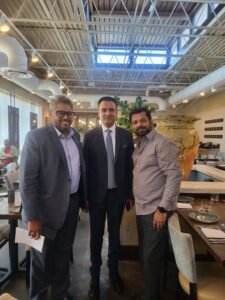A Pivotal Meeting: Lalani Shamsu and Amit Kumar Sharma Discuss the Future of Media and Global Indian Community Engagement
On June 25, 2024, a significant meeting took place at Rumi’s Atlanta, marking a pivotal moment for the South Asian community in the USA. Lalani Shamsu, the esteemed Editor and Publisher of Desi Express Magazine, met with Amit Kumar Sharma, the Head of Americas for VFS Global. This encounter was not just a routine meeting but a profound discussion on the evolving dynamics of media and the role of the global Indian community in the broader diaspora.

Lalani Shamsu has been a prominent figure in the media landscape, particularly known for his role in elevating Desi Express Magazine to a platform that celebrates and advocates for the South Asian community in North America. Under his leadership, the magazine has become a beacon of culture, politics, and community news that resonates deeply with its readers.
Amit Kumar Sharma, on the other hand, has played a crucial role at VFS Global, an organization instrumental in managing visa and passport issuance-related administrative tasks for its client governments. His expertise lies in understanding the nuances of global migration and the movement of people in the context of globalization.

Discussion Highlights
The discussion centered around several key themes:
Media’s Role in Cultural Preservation: Lalani Shamsu emphasized the responsibility of media outlets like Desi Express Magazine in not only reporting news but also in preserving and promoting South Asian cultures. He highlighted how the magazine has been actively involved in celebrating cultural festivals and events that are crucial for the diaspora to maintain their connections with their roots.
Influence of Digital Transformation: Amit Kumar Sharma brought insights into how digital platforms are revolutionizing the way communities engage and interact. He discussed VFS Global’s role in facilitating easier access to essential services through digital solutions, which can be a model for media outlets to follow in terms of digital engagement.
Collaboration Opportunities: Both leaders explored potential collaborations between Desi Express Magazine and VFS Global. They discussed creating joint initiatives that could benefit the diaspora, such as informative workshops on visa processes, travel advisories, and feature stories on the challenges and successes of South Asians abroad.
Community Engagement: A significant part of the discussion was dedicated to understanding the needs of the South Asian community in America. Both Shamsu and Sharma expressed a strong desire to engage more deeply with the community to better serve their needs through their respective platforms.
Future Trends in Diaspora Dynamics: The conversation also veered towards the future, discussing trends affecting the diaspora, including changes in immigration laws, socioeconomic factors influencing migration, and the role of the next generation in shaping the future of the South Asian community in the USA.
The meeting between Lalani Shamsu and Amit Kumar Sharma was more than just a formal engagement; it was a dialogue that delved into the essence of cultural identity, media’s evolving role, and the future of the South Asian diaspora in America. As they concluded their meeting, it was evident that both leaders were committed to leveraging their platforms for the greater good of the community, promising exciting developments for their audiences.
This significant interaction not only strengthened the ties between Desi Express Magazine and VFS Global but also set the stage for future collaborations that could redefine how the South Asian community engages with media and essential services. The outcomes of this meeting are likely to resonate well into the future, influencing initiatives that support cultural preservation, community engagement, and the overall empowerment of the diaspora.

Q1: What is VFS Global? What services does the company provide?
The concept of visa services outsourcing was created in 2001 by VFS Global. Today, we are the world’s largest outsourcing and technology services specialist for governments and diplomatic missions worldwide. As a trusted partner to client governments, we handle the front-end administrative tasks in the visa application process.
This includes collecting application forms and documentation as per the checklist provided by the government, enrolling biometrics where applicable, and ensuring the safe return of passports post the decision-making process by the embassy or consulate. As VFS Global manages the front-end administrative tasks, it enables governments to focus entirely on the critical task of judgemental assessment and decision-making.
We currently work with 68 client governments operating a global network with more than 3,400 application centres in 153 countries. The company has successfully processed over 292 million applications since its inception in 2001.
Q2: What are the most common complaints of Indian visa applicants?
The most common queriesrelate to error messages while booking an appointment. During this process, our website shares adequate prompts to assist applicants with most error messages they may encounter. At certain times due to very high demand, one may need to wait a while and retry. In case the error persists, applicants can reach out to our dedicated helpline teams to seek assistance.
The following are the most common issues faced by the applicants:
- Confusion regarding documents, especially,renunciation of Indian citizenship and the OCI. A common question is whether an Indian passport with a stamp indicating Passport “Cancelled” is sufficient or a formal renunciation certificate is needed.
- Difficulties in understanding the difference between a surrender certificate and a renunciation certificate.
- Renunciation Certificate is issued to the applicants who have not lost the most recent/last held Indian passport and are applying for the renunciation.
- Surrender Certificate is issued to the applicants who have lost the last held Indian passport.
- Sometimes applicants don’t fill in their names correctly. While fillingout the online government form, the name must match the current passport, and any changes in the personal particulars must be part of the service selection.
*Applicants can additionally refer to the FAQs on our website for more detailed information.

Q3: Easier process for travel documentation has been a long-term demand. How VFS is addressing the same?
It is ourcontinued effort to enhance efficiency by analyzing and improving our processes to make cross border mobility easy, convenient and comfortable for both the applicants and the governments.
Sensing the evolving need for personalised services, we introduced Visa at Your Doorstep (VAYD), a service that has seen increased demand. Mobile kits are carried to the applicant’s doorstep for capturing biometrics of individuals at homes, offices, as well as university campuses. However, VAYD is currently not available for applicants of Indian Consular services.
Q4: What are the new services that you have introduced to make the processes faster and more convenient?
We offer many optional additional services to applicants for their greater personalisationand convenience. Services such as document scanning, photocopying, digital document checks, locker service, courier charges, form-filling, SMS service, Premium Lounge, Visa at Your Doorstep, etc.have been introduced for customers based on their needs in consultation and with the approvals of the respective governments. By focusing on providing exceptional customer service, we ensure a convenient and seamless experience for our customers.
Q5: The diaspora community is keen to know about the OCI cards. What tips would you have for OCI applicants?
To apply for OCI, it is mandatory for former Indian nationals to provide a Certificate of Renunciation of Indian Citizenship. If an applicant does not have the Renunciation Certificate, they need to apply for it first and after receiving it, apply for the OCI. We advise applicants to take time to read the process/procedure and prepare well in advance.Only whenall these processes are followed and the required details are filled accurately, should the documents besubmittedas per the standard requirement format in the application.
As per Government ofIndia, the normal processing time for a new OCI application (based on Indian origin) is 4-5 weeks from the date of registration of the application in the Consulate whereas for re-issuance/updation of OCI Cards, it is 5-6 weeks. This is subject to getting the necessary clearance from the Ministry of Home Affairs(MHA).
Q6: Has the travel industry recovered fully post-COVID? What trends are expected in the future?
2023 marked the first full year of unrestricted travel since the pandemic began.Across all types of travel—be it for business, leisure, or education—2023 saw a return to pre-COVID norms.We have observed a consistent surge in visa applications across markets driven by the early travel rebound and the global trend of ‘revenge travel’. The travel sector’s recovery in 2023 and 2024 was robust and widespread, with every category of traveller re-engaging with the industry.
Looking ahead, 2025 is expected to continue this positive trend, further strengthening the travel sector.
Q7: You work closely with the Indian consulate. The government is also taking proactive measures for the diaspora community. Could you tell us more about consular camps? How are they organised and what are the services provided?
Consular Camps in the U.S. held in partnership with the Indian Embassyhave been a huge success since they began in 2021. We held 17 consular camps in 2021,22in 2022 and in 2023 we conducted23 consular camps. Considering the popularity of these camps, we have we have successfully conducted 17 consular camps, so far in 2024. We closely coordinatewith Indian diaspora associations toorganise the camps at a convenient location for the community, especially on a weekend. Before the camp, we set up an appointment system to ensure efficient processing and preparation of required documents. Appointment slots are provided weeks in advance to enable applicants plan and gather their documentation effectively.Themost significant demand we’ve observed is for Indian passport renewal and OCI services. So far, we have processed over 10,000 applications in these consular camps.
Q8: What tips and timelines would you share for prospective visa applicants?
VFS does not control processing timelines of visa applications. So, we regularly encourage applicants to apply well in advance of their travel keeping processing timelines of different governments in mind. All documentation requirements and other aspects follow the clear guidelines and mandates of our client governments.
Travel documents tend to take longer processing time during the peak travel season. Every country has a different turnaround time for processing the visa application. Most countries accept applications up to 90 days before the date of travel and applying for a visa well in advance allows enough time to deal with any unforeseen delays.
Q9: When it comes to documentation. The question of data and information security arises. What measures has VFS employed to ensure the safety and sensitivity of the Data?
Data protection and information security are business critical functions at VFS Global. As a trusted partner to 68 governments with an extensive global network across 153 countries and a responsible corporate citizen, we comply with various data localisation, privacy, and protection laws, including GDPR.
In line with the service level agreements with our client governments, applicant data is automatically purged from our systems as soon as the application data is transferred to our client governments. Also, data security is fully embedded within the design and functioning of our processes. We fully adhere to the highest international standards such as ISO/IEC 26801:2013, UK Cyber Essentials, Spain National Cybersecurity framework, Germany IT Grundschutz etc.Over the years, we have invested significant resources in building these functions with very robust systems and controls.
Q10: What initiatives are implemented by VFS to connect with the diaspora community in the United States?
The Indian diaspora in the United States is vast and diverse. To effectively serve their needs, we maintain ongoing engagement with the community. By partnering with the Indian Embassy, consulates, and diaspora associations, we’ve established a strong presence. We recently launched two new centers in Seattle and Bellevue to support the region’s large Indian population. Through consular camps, community outreach, and feedback channels, we work diligently to understand and address the unique challenges and aspirations of the diaspora. This enables us to provide exceptional customer service and make cross-border mobility a convenient and seamless experience.
